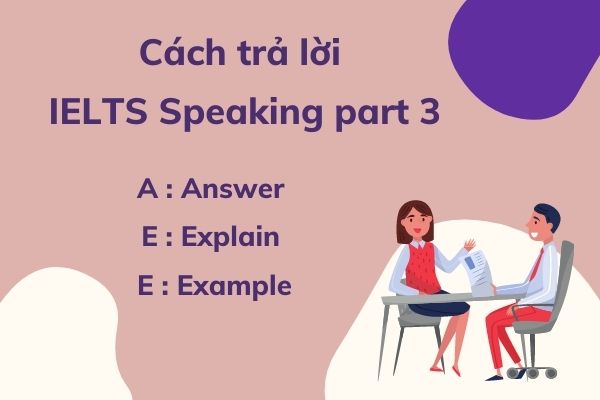


IELTS Speaking Part 3 là một trong những phần thi mà khiến nhiều bạn thường gặp khó khăn và lo lắng khi bước vào thi. Đây là phần cuối cùng trong toàn bài thi IELTS Speaking nên chắc hẳn độ khó được tăng cao cũng như tâm lý của các bạn thí sinh cũng bị ảnh hưởng bởi hai phần thi trước.
Vậy, làm thế nào để vượt qua phần thi này thật trôi chảy? IELTS LangGo sẽ hướng dẫn cho các bạn cách để đạt điểm cao trong phần thi IELTS Speaking Part 3 nhé.
Trước khi bước vào tìm hiểu chi tiết về những phương pháp trả lời cụ thể trong phần IELTS Speaking Part 3, chúng ta cần nắm được những thông tin tổng quan cơ bản về phần thi này. IELTS Speaking part 3 là gì?
IELTS Speaking Part 3 là phần thi cuối cùng trong toàn bộ bài thi IELTS Speaking và kéo dài trong khoảng 4 - 5 phút. Với phần thi này, giám khảo sẽ tiếp tục hỏi bạn những câu hỏi liên quan đến chủ đề mà bạn đã trả lời trong part 2. Tuy nhiên, những câu hỏi của part 3 có độ khó cao hơn, mang tính chuyên sâu và mở rộng hơn.
Hình thức trả lời của part 3 speaking thì khá giống part 1. Phần này yêu cầu việc trao đổi, thảo luận giữa giám khảo và thí sinh nên những câu trả lời nên ngắn gọn, xúc tích và đi vào trọng tâm. Khác hẳn với hình thức thi part 2 là thuyết trình ngắn về vấn đề mà giám khảo đưa ra. Cùng IELTS LangGo tìm hiểu tiếp về các dạng bài và IELTS Speaking part 3 tips nhé!
Trong phần IELTS Speaking part 3 có rất đa dạng về những câu hỏi mà chúng ta có thể gặp. Tuy nhiên, đa phần các câu hỏi của phần này có thể gói gọn trong 6 loại chính mà các bạn có thể tham khảo dưới đây:
Dạng câu hỏi này thường bắt đầu với “What do you think/Do you think….?”. Mục đích của dạng câu hỏi này chính là yêu cầu thí sinh bày tỏ, đưa ra ý kiến, quan điểm cá nhân của bản thân về một vấn đề cụ thể.
Ví dụ như:
Do you think the Internet has affected the music industry? In what ways?
Why do you think that some local singers or musicians aren’t as successful as some from other countries?
What do you think is the best way to learn about another culture?
Phương pháp trả lời tốt câu hỏi này chính là diễn đạt ngắn gọn quan điểm cá nhân của mình và từ đó, đưa ra những dẫn chứng, ví dụ từ thực tế để chứng minh cho ý kiến của mình.
Để đạt được điểm cao, đừng gói gọn câu trả lời của mình bằng những cấu trúc ngữ pháp quá quen thuộc và đơn giản mà hãy cho ban giám khảo thấy khả năng và vốn ngữ pháp của bạn thật đa dạng.
Dưới đây sẽ là một số cấu trúc giúp bạn có thể nâng cao điểm của mình trong phần thi IELTS Speaking part 3:
As far as I’m concern….
To be honest, I think…..
I reckon/I admit …..
I strongly believe that ….
I’m strongly against ….
I’m strongly a favor of ….
Dạng câu hỏi này nhằm yêu cầu thí sinh đưa ra những dự đoán trong tương lai về một chủ đề nhất định.
Ví dụ như:
Do you think there will be further changes in the music industry in the future?
What types of trips/holidays will people take in the future?
What environmental problems will we see in the future?
Những cấu trúc ngữ pháp mà bạn có thể sử dụng để trả lời loại câu hỏi này là:
It is highly likely/unlikely that …..
Most probably, I reckon that ……
It has long been predicted that …..
It is not very likely that …..
It is foreseeable …..
Conditional clauses with If ……
Loại câu hỏi này được dùng để hỏi về những người hoặc nhóm người nhất định tại đất nước của bạn. Các bạn đừng nên chỉ tập trung nói về những trải nghiệm của bản thân hay ai khác mà điều quan trọng là nên bày tỏ những đánh giá chủ quan về nhóm người đó.
Một vài ví dụ về dạng câu hỏi này mà bạn có thể gặp là:
Why do people get nervous when they have to give a speech?
What do teenagers in your country use cellphones for?
What do people living in the countryside like to do?
Để trả lời tốt câu hỏi này, các bạn có thể sử dụng những cấu trúc sau:
The majority of people in my country …..
Most people would prefer to ….
A lot of people feel ….
Generally, most people tend to ….

6 dạng câu hỏi thường gặp trong IELTS Speaking part 3
Ở dạng câu hỏi này, thí sinh cần sử dụng vốn ngữ pháp của mình để bày tỏ quan điểm so sánh 2 vật, 2 người hoặc 2 nhóm người với nhau hoặc nhiều người, nhiều vật.
Ví dụ như:
What’s the difference between living in the city and in the countryside?
What is the best/most important thing your culture/country has adopted from another culture?
Bạn có thể sử dụng những cấu trúc dưới đây để trả lời dạng câu hỏi này:
A is better than B
A is more effective than B
A and B are good but C is the best
Among ......., is the most interesting
Cũng khá tương tự với dạng câu hỏi trên nhưng dạng câu hỏi này là so sánh với quá khứ. Để đối mặt với dạng câu hỏi này, các bạn có thể sử dụng những cấu trúc so sánh hơn, so sánh nhất và cả những cấu trúc nói về quá khứ.
Những ngữ pháp thường được sử dụng với dạng câu hỏi này là: cấu trúc used to, cấu trúc thì quá khứ đơn, quá khứ tiếp diễn, quá khứ hoàn thành, quá khứ hoàn thành tiếp diễn.
Ví dụ:
Câu hỏi: Are there any differences between the types of people who were seen as celebrities in the past and those who are celebrities nowadays?
Trả lời: Yes, I think there have been some big changes in the types of people who become famous. In the past, before the invention of television, I suppose there were very few national or international celebrities; maybe kings and queens, military, political and religious leaders were the only household names. With the advent of TV and radio, performers such as actors and musicians became more well-known. However, we now seem to have a completely new breed of celebrity as a result of 'reality' television programs; these are people who don't really have any special skills as performers, but who are famous for just being themselves.
Nguồn: IELTS Simon
Trong loại câu hỏi này, giám khảo sẽ mong muốn thí sinh phải thảo luận về những nguyên nhân và ảnh hưởng nhất định của một vấn đề nào đó.
Ví dụ về dạng câu hỏi này:
Why are elected politicians often so unpopular?
What influences the styles, values and interests of a generation?
Hãy ghi nhớ những cấu trúc ngữ pháp dưới đây để áp dụng và trả lời những câu hỏi về nguyên nhân và ảnh hưởng:
Because/Because of …
As a result,...
Result in ….
As a consequense …
Due to ….
Caused …
… led to …
… mean that …
Consequently, …
Để hiểu một cách chi tiết hơn về 6 dạng câu hỏi này, các bạn có thể theo dõi những video dưới đây của LangGo để được nghe giải thích rõ hơn và theo dõi nhiều ví dụ minh họa:
Khám phá ngay 6 dạng câu hỏi thường gặp nhất khi luyện thi IELTS Speaking Part 3
Đây là phần khó nhất trong toàn bài thi Speaking vì hầu hết những câu hỏi mà ban giám khảo đưa ra đều khá chuyên sâu và phức tạp. Chính vì vậy, để có thể giữ bình tĩnh, trả lời câu hỏi thật tốt và dành điểm cao thì bạn cần phải nắm được chiến thuật về các bước trả lời cụ thể. Ngoài ra bạn cũng cần kết hợp với những IELTS Speaking part 3 tips mà chúng mình đã tổng hợp ở dưới.
Sau đây IELTS LangGo sẽ giới thiệu cho các bạn cách trả lời IELTS Speaking part 3 hiệu quả nhất.
Ở phần part 3 Speaking này, câu trả lời của các bạn lên giữ ở độ dài 3 đến 4 câu, tập trung vào những vấn đề chính, tránh trả lời lan man nhưng cũng không nên quá ngắn vì phần này hầu hết là những câu hỏi khó và phức tạp, yêu cầu thí sinh bày tỏ góc nhìn và quan điểm của mình.
Các bạn có thể áp dụng cấu trúc 3 bước trả lời là:
A : Answer - Đưa ra câu trả lời, đáp án cho câu hỏi mà ban giám khảo vừa đặt ra.
E : Explain - Giải thích cho câu trả lời mà mình đưa ra một cách cụ thể và cặn kẽ.
E : Example - Đưa ra ví dụ, dẫn chứng cụ thể cho câu trả lời của mình.
Các bạn có thể theo dõi ví dụ này để hiểu rõ hơn cách trả lời part 3 speaking IELTS:
Câu hỏi: Do you think it‘s a good idea to teach children to read before they start school?
Câu trả lời với đầy đủ 3 bước như sau:
Answer: Yes, I think it’s important to try to teach children how to read at as early an age as possible.
Explain: The earlier they know how to read, the sooner they can start learning other things. Also, if you teach them early, it may instill a desire in them to keep learning throughout their lives, which would be extremely valuable.
Example: I know my parents started me reading very young, and today I think I am better off because of it.
Nguồn câu hỏi và câu trả lời: IELTS Material

Tham khảo chiến thuật trả lời các câu hỏi trong IELTS Speaking part 3
Ngoài ra, trong một số câu hỏi phức tạp hơn, các bạn cũng có thể paraphase lại câu hỏi như một phần giới thiệu trước khi bước vào nội dung chính trong câu trả lời.
Để hiểu rõ hơn về các bước trả lời IELTS Speaking part 3 questions, các bạn có thể theo dõi tại video dưới đây của LangGo:
Xử lý nhanh các câu hỏi trong IELTS Speaking part 3
Bên cạnh việc nắm được cách trả lời theo các bước, các bạn cũng cần biết một vài tips để có thể trả lời tốt và không bị mất điểm trong một vài tình huống cụ thể.
Khi không nghe rõ câu hỏi từ giám khảo
Trong một vài trường hợp, có thể bạn sẽ không thể nghe rõ câu hỏi mà giám khảo vừa đặt ra vì nhiều lý do. Việc này thường khiến cho nhiều bạn thí sinh cảm thấy lo lắng và cuống hơn. Hoặc đôi khi, câu hỏi xuất hiện một thuật ngữ nào đó mà bạn không hiểu.
Khi đó, nhất định đừng lo lắng hay run sợ, hãy thật bình tĩnh rồi hỏi lại hoặc nhờ giám khảo làm rõ câu hỏi để bạn có thể hiểu. Tuy nhiên, bạn nên tập trung và tránh việc hỏi lại giám khảo quá nhiều lần.
Khi câu hỏi khó và không biết câu trả lời
Đừng nên chần chừ quá lâu nếu gặp phải một câu hỏi về chủ đề mà bạn không biết, hãy cho giám khảo biết được là bạn đang gặp phải khó khăn với câu hỏi này. Để làm được, hãy sử dụng một cấu trúc câu và cách diễn đạt để giám khảo nhận thấy rằng bạn cần thêm thời gian để suy nghĩ.
Bạn có thể diễn đạt như sau:
That's a difficult question, let me think for a second.
That's a very interesting question, let me think.
It's very difficult to know exactly, but I think/but I believe/perhaps…
I don’t know for sure, but I would say ….
I haven’t really thought about it but I reckon ….
It is not something considered, but I guess ….
Dưới đây là một vài IELTS Speaking part 3 sample để các bạn có thể học hỏi và tham khảo cách trả lời về chủ đề Travelling:

Tham khảo bài mẫu cho phần IELTS Speaking part 3
Do people in your country like to travel?
Yes, people in India like to travel. India is a colossal country to travel around. There are so many beautiful and adventurous places here. Hence people of India are athirst to travel from one place to another. Indians are always keen on discovering the daring and quixotic moments through travel. Nowadays, Indians mostly travel with friends wherever they get a vacation or a weekend
How has travelling changed, compared to several decades ago?
With the growing population and economic growth, India has changed especially in regards to travel. People now travel for uploading travel blogs, pictures or everyday travel videos on social media.The mode of transportation has improved a lot, as travel now is cheaper, comfortable and faster. Nowadays content creators go to places, find stuff and share in social media which is phenomenal. Now travel has become so easy that anyone can go for a long vacation.
When do people travel (as tourists), whom do they usually go with?
People usually travel with family friends or loved ones for a weekend to a neighbouring country or for a family vacation or for long travel. There is something within us that triggers us to pack our bags and visit a new place. Tourists mainly visit India, especially the southern part of India, during April – May and December for experiencing the crystal blue waters and soft white sand beaches. Tourists usually visit India with family and friends. Some people come with their loved ones to spend their most adventurous moments of life.
Do you think travel can (or, does) change people’s ways of thinking?
I think travel has made people better communicators. It has allowed people to be more patient. Through travelling, people can get to know a lot more about the world around them. Travel increases the desire to meet new people and pushes one to explore all kinds of amazing, admirable things. You become a well-rounded person just by experience. Travelling focuses on a greater sense of empathy and we also gain knowledge about diverse cultures. Interaction with people is another pathway to revitalize our minds. I think travelling really develops a personality. They become less judgemental, more stable, more open-minded, find themselves more optimistic, and don’t panic often.
What are the disadvantages of not travelling?
There are many disadvantages of not travelling to a new place. Many educational and health benefits will be missed. We will be unable to learn new cultures and languages. Memories for a lifetime will really pass over. You will not be able to deal with the stress, if you don’t take a break and travel. Also, you cannot sense and appreciate independence. You cannot boost confidence within yourself. You cannot realize your passion if you are not physically exploring places.
Nguồn: IELTS Material
Như vậy, trên đây là những kiến thức mà LangGo đã tổng hợp và chia sẻ cho các bạn về tổng quan lẫn IELTS Speaking part 3 tips . Đừng quên theo dõi những bài viết của LangGo để tích lũy thêm nhiều kiến thức hữu ích về IELTS Speaking nha.



ĐẶT LỊCH TƯ VẤN MIỄN PHÍ LỘ TRÌNH Săn ƯU ĐÃI lên tới 12.000.000đ